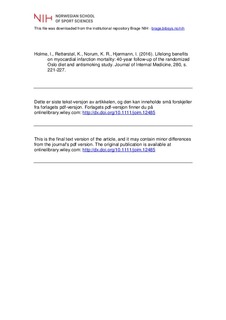| dc.contributor.author | Holme, Ingar Morten K. | |
| dc.contributor.author | Retterstøl, Kjetil | |
| dc.contributor.author | Norum, Kaare Reidar | |
| dc.contributor.author | Hjermann, Ingvar | |
| dc.date.accessioned | 2017-02-27T13:12:15Z | |
| dc.date.available | 2017-02-27T13:12:15Z | |
| dc.date.issued | 2016-02-29 | |
| dc.identifier.citation | Journal of Internal Medicine. 2016, 280, 221-227 | nb_NO |
| dc.identifier.uri | http://hdl.handle.net/11250/2432213 | |
| dc.description | I Brage finner du siste tekst-versjon av artikkelen, og den kan inneholde ubetydelige forskjeller fra forlagets pdf-versjon. Forlagets pdf-versjon finner du på onlinelibrary.wiley.com / In Brage you'll find the final text version of the article, and it may contain insignificant differences from the journal's pdf version. The definitive version is available at onlinelibrary.wiley.com | nb_NO |
| dc.description.abstract | Background: The effects of saturated fat on atherosclerotic vascular disease are currently debated. Objectives: In the Oslo cardiovascular study initiated in 1972/1973, a 5-year randomized intervention was conducted in healthy middle-aged men at high risk of coronary heart disease to compare the effects on coronary heart disease incidence of diet and antismoking advice versus control (no intervention). A significant reduction (47%) in first myocardial infarction incidence was observed. We have followed mortality up to 40 years to establish whether a lifelong benefit on mortality risk of myocardial infarction could be observed. Methods: In the present study, a total of 16 203 men (63% of those invited), aged 40–49 years, participated in a screening examination. Overall, 1232 men with total serum cholesterol levels of 6.9–8.9 mmol L−1 (80% smokers) were included in the study. The dietary intervention consisted of mainly decreasing the intake of saturated fats and increasing fish and vegetable products, as well as weight reduction in overweight subjects. Smokers were advised to stop smoking. Cox regression analysis was used for statistical analyses. Results: The intervention group showed a sustained reduced risk of death at first myocardial infarction (hazard ratio 0.71, 95% confidence interval 0.51–1.00; P = 0.049), compared to control subjects up to 40 years. During follow-up, the beneficial effect developed gradually but proportionally up to about 15 years after randomization. Later, the curves were parallel. All-cause mortality decreased in the period 8–20 years after randomization, but not thereafter. Conclusions: Receiving advice about a healthy lifestyle led to a long-term reduced risk of coronary mortality during the following 40 years. Our results suggest that systematically providing effective counselling for a healthy lifestyle for 5 years can lead to lifelong benefits. | nb_NO |
| dc.language.iso | eng | nb_NO |
| dc.publisher | Wiley | nb_NO |
| dc.subject | coronary heart disease | nb_NO |
| dc.subject | diet | nb_NO |
| dc.subject | mortality | nb_NO |
| dc.subject | prevention | nb_NO |
| dc.subject | smoking | nb_NO |
| dc.title | Lifelong benefits on myocardial infarction mortality: 40-year follow-up of the randomized Oslo diet and antismoking study | nb_NO |
| dc.type | Journal article | nb_NO |
| dc.type | Peer reviewed | nb_NO |
| dc.subject.nsi | VDP::Medisinske Fag: 700 | nb_NO |
| dc.source.journal | Journal of Internal Medicine | nb_NO |
| dc.identifier.doi | 10.1111/joim.12485 | |
| dc.description.localcode | Seksjon for idrettsmedisinske fag / Department of Sports Medicine | nb_NO |
